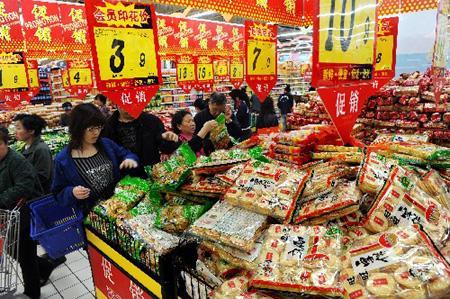Spending decline, cracks in economic structure
- By Geoffrey Murray
 0 Comment(s)
0 Comment(s) Print
Print E-mail China.org.cn, January 26, 2012
E-mail China.org.cn, January 26, 2012
Optimists predicting smooth growth of the Chinese economy in 2012 seem to base themselves partly on an assumption that domestic spending is an adequate, sustainable substitute for exports in bolstering GDP. However, I'm not so sure.
|
|
|
[File photo] |
With an economic crisis biting deep into foreign demand for Chinese goods that enjoyed spectacular sales in recent years, hopes have been placed on the local consumer to keep the ship not only afloat, but sailing full steam ahead.
For example, domestic sales of consumer products, such as electrical appliances (about a third of whose output had been shipped abroad in recent years), benefitted greatly from a central government policy to keep the market buzzing by subsidizing purchases to move goods off the shelf.
However, that policy seems to have run its course, creating a need for a new one.
Government subsidies are all very well, but I cannot see how they can promote long-term healthy and stable economic growth. It's really a matter of transferring money from one pocket to the other to create an illusion that all is well.
Most subsidies were aimed at persuading previous non-users, especially in rural areas, to purchase a whole range of home appliances - so-called "white goods".
And, in recent years, it seems to have been a good policy, with manufacturers consistently enjoying annual sales growth of 20 to 30 percent. However, even the massive, mouth-watering market of China has its limitations. Once you have bought a washing machine or refrigerator you are removed from the equation for a number of years until it wears out and needs to be replaced.
Anyway, the scheme is now abandoned in many areas. A program that offered 10 percent discounts for those willing to buy a new appliance in place of an old one was revoked before the end of 2011, and subsidies offered to rural households to buy "luxury" items like TV sets expired in some areas (for example, Henan, Shandong and Sichuan). Added to this are those too poor to afford such items even with discounts.
Walk into an appliance store in most places right now and the evidence is there before you: not many customers.
According to trade sources, at the height of the sweltering summer heat in 2011, there were well over 16 million unsold, unwanted air conditioners piled up in warehouses.
As such inventories have grown - microwave ovens, cookers and refrigerator sales have also slumped - appliance stores and appliance manufacturers have resorted to the usual coping measures: laying off or dismissing workers and cutting the wages of the workers who remain.
That has inevitably led to protests, creating just the sort of social unrest the government fears most in undermining the national stability needed to keep the economic wheels turning.
And there is nothing more likely to stifle consumer enthusiasm for spending on "big ticket items" than loss of job security. That's when money tends to end up stored under the bed mattress, especially when the global economic picture still looks somewhat gloomy.
The statistics show clearly how things are slowing down: in the first half of 2011, revenue from sales of household appliances rose 12.8 percent, which was almost half the figure at the height of the boom in 2010.
Many people actually borrowed money to take advantage of the discounts and now they must pay back the loans - further dampening the market for fresh sales. The industry itself concedes growth prospects are not good for the next two or three years.
Actually, this may not be a bad thing. The government subsidies ensured domestic manufacturers could offload inferior products with no incentive to improve. If these products are now piling up in the warehouses, then maybe the manufacturers will be encouraged to turn their attention to improving the technology and the quality (also needed in foreign markets if and when the global economy improves).
No doubt, many factories will plead hardship and ask the government for subsidies for new R&D programs - another potential drain on the already overloaded State finances.
Surely, though, this is a chance for industrial restructuring through mergers and closures to create a sector that better meets future needs. This has already been carried out fairly ruthlessly by the government in some sectors (tobacco, for example) - "short-term pain in expectation of long-term gain".
And, local governments could do more if they wanted. They pour billions down the drain every year in an unhealthy construction boom that is creating "ghosts towns" with high-rise apartments and office buildings that will never be filled and luxury hotels that will never have enough guests to make money.
Let's stop this nonsense and put money into things that might have a real chance to promote sound economic growth and create real long-term, unsubsidized, consumers.
The author is a columnist with China.org.cn. For more information please visit: http://www.china.org.cn/opinion/geoffreymurray.htm
Opinion articles reflect the views of their authors, not necessarily those of China.org.cn.







Go to Forum >>0 Comment(s)